THE LANDSCAPING SOLUTIONS BLOG
Welcome to our Blog. Inspiration, updates and industry trends from the team at Landscaping Solutions.
A WILD VARIETY
Landscaping Solutions MD Ben West explains why only using native plants is not necessarily the best option.
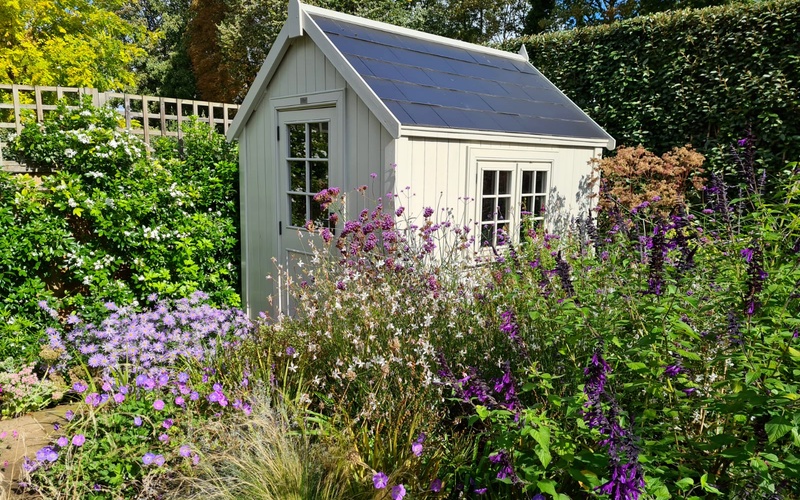
Diverse late Summer herbaceous perennials in a garden built and maintained by Landscaping Solutions in Twickenham, South West London.
In one of our recent blog articles, I extolled the virtues of garden ‘weeds’ in light of their potential to re-connect us with nature; I proposed a move away from our entrenched revulsion toward a position of reverence. As much as I love native wildflowers and have learned much about myself and the wider world from a close relationship with them (not to mention benefitted immeasurably from their medicinal and culinary properties), I don’t want to give the impression I’m an advocate of allowing our plots to go completely to seed. Rather, I’m looking to promote a more laissez faire attitude that permits weeds be cherished rather than demonised in order to improve the biodiversity of our gardens, and our nation, as a consequence.
The key component here is the notion of surrender, of letting go of deeply held opinions when faced with evidence that suggests they might be damaging or just simply unfounded. This is a lesson we can all take on board whatever our feelings on what constitutes a successful garden.
For instance, proponents of wildlife gardening have traditionally espoused using only ‘native’ plants. However, research by Dr. Ken Thompson and his colleagues at the University of Sheffield suggests otherwise. Ken is a plant ecologist who was part of the ‘Biodiversity in Urban Gardens’ or ‘BUGS’ project which investigated the significance of urban gardens in Sheffield for natural diversity back in 2000. Their findings blew apart the doctrine that held ‘native’ superior to ‘alien’ plants in terms of their ability to support wildlife. Ken and the team found that, so long as they delivered the goods in terms of providing food, shelter and a place to raise young, most wildlife didn’t much care for the origins of any particular plant. In fact, more importance rested on schemes that were diverse and varied in flower type and shape, rich in nectar and planted in swathes of the same species. Gardens providing successional planting and extended individual flowering periods also displayed increased biodiversity. In addition, pollinating insects showed a preference for plants closer to the ancestral species rather than highly modified versions such as double flowered varieties.
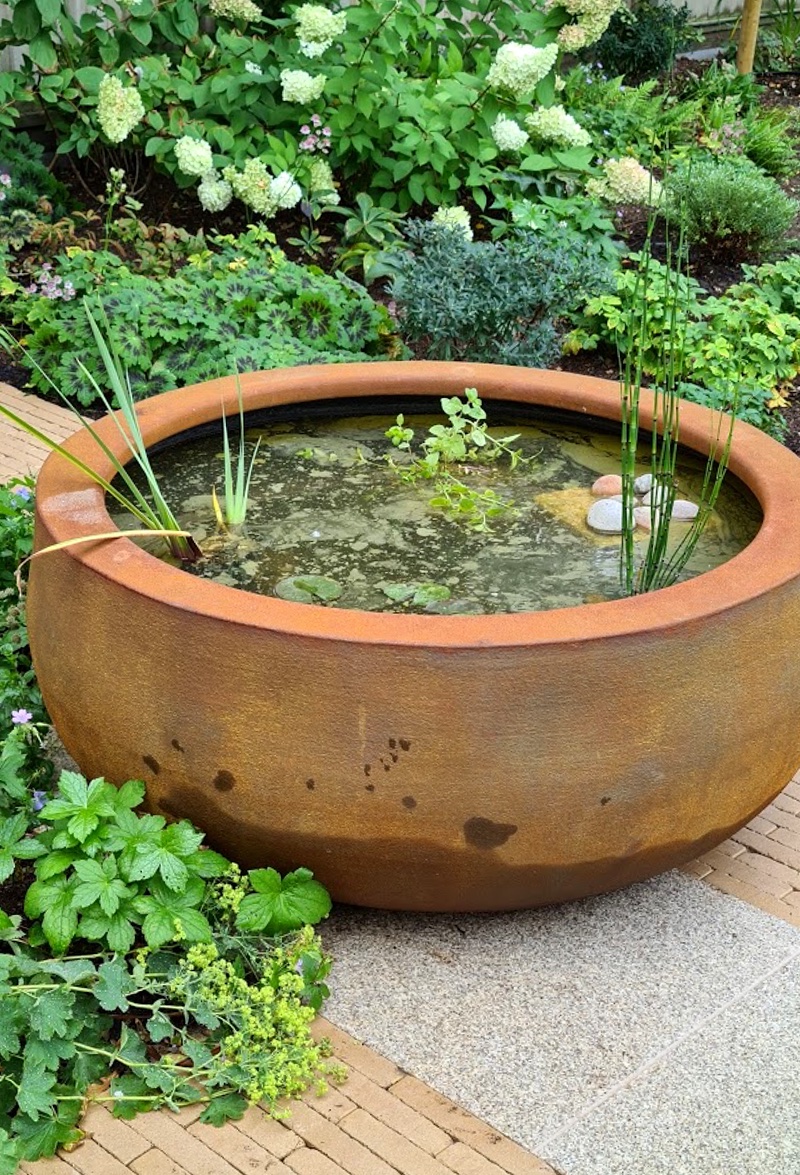
Ponds and water features are just one way of increasing biodiversity in a garden.
The BUGS project also discovered a list of other features those wishing to increase biodiversity should include in their gardens, namely trees, ponds, compost heaps, walls, hedges and, importantly, combinations of the above to provide variation and diversity. The project also stipulated avoiding the following elements: closely mown grass, extensive areas of hard surfacing, the use of chemicals and, last but not least, excessive tidiness.
It has always been my anecdotal experience that nature loves a bit of ordered chaos and this was supported by the BUGS project findings. Think of the grass snake in the compost heap, the whitethroat nest in the bramble patch or the pile of cinnabar moth caterpillars on that scrap of ragwort you forgot to weed out. This is the very essence of wildlife gardening and affirms why a little bit of ‘conscious neglect’ goes a long way. It is important not to understate the significance of loosening up our attitudes. If we are to redress the imbalance that 50+ years of over-zealous gardening has instilled, then we must stop treating gardens like we do the rest of our uptight, downtrodden and increasingly straight-jacketed lives, whichever side of the fence we are on.
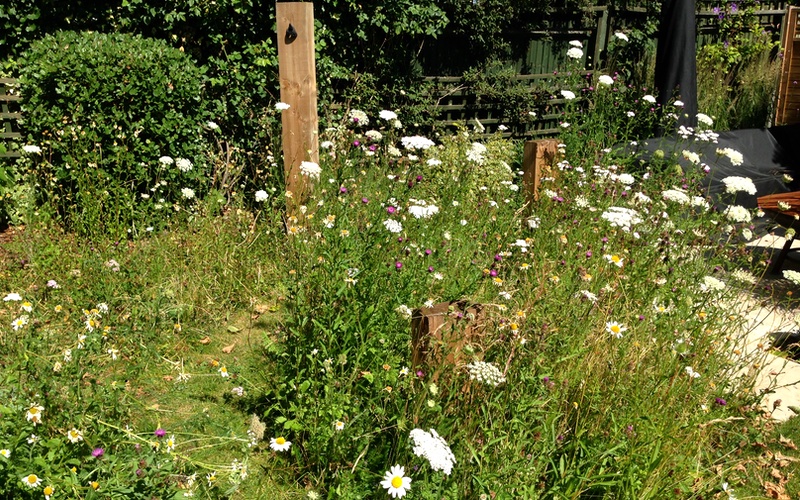
An example of ordered chaos in a garden built and maintained by Landscaping Solutions.
Those wishing to gain a sharper understanding of what wildlife gardening is really all about should read the illuminating ‘No Nettles Required’ by Ken Thompson.
Feel free to drop us a line with your thoughts and feedback on this article at info@landscapingsolutionsltd.co.uk.
SUSTAINABLE GARDEN DESIGN - THE FUTURE OF LANDSCAPING
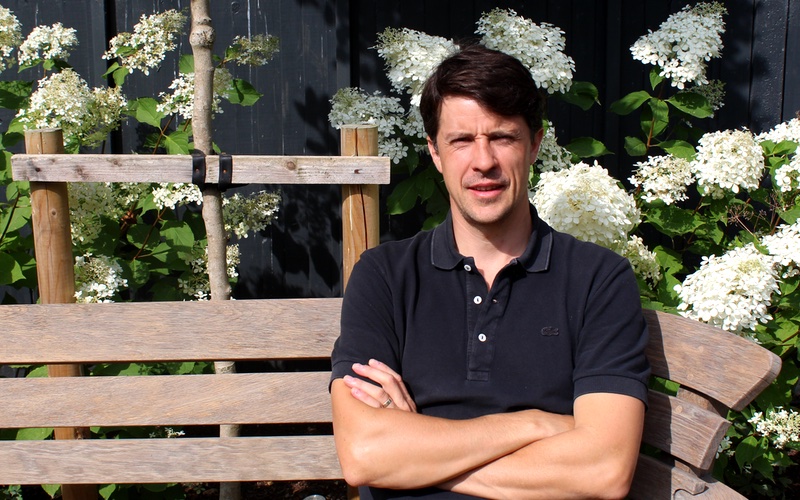
Ben West, Landscaping Solutions.
Garden designers and landscapers are in a unique position. We not only build gardens but bring an enormous pool of knowledge that influences the materials used, the plants chosen…and the wildlife that will visit them.
We’ll all take our own lessons from these lockdown weeks, but one of the precious things that they’ve given, rather than taken away from us, is time to think, to reassess and to create intent.
One of the most prevalent shared experiences of these weeks seems to be a greater appreciation of Nature, of its therapeutic value and how much we miss it when we cannot access it. Birdsong has become more noticeable, the air clearer. Butterflies seem more plentiful in the gorgeous weather.
Here in South West London, I’d venture that the leaves look a brighter green because of the lack of pollution.
Last year, the summit meeting at Futurescape concentrated on how the landscape industry might address climate change and I was on the podium as part of the discussion panel. When I looked around the meeting room, I saw impassioned and informed individuals seeking unity on the subject and itching for more progress within the industry.
It’s a matter that has been close to my heart for a long time. At Landscaping Solutions we began to increase the sustainability of the business some time ago. Seemingly small actions mount up to a much larger overall impact. But we believe there needs to be a more unified approach across the landscaping world.
Sustainability begins at ground level, before a spade is lifted. Putting it at the very beginning of a garden design project opens the opportunity for dialogue-rather than deciding on a material and us looking for a way to increase its sustainability through the supply chain or installation methods, it offers the chance to discuss materials and methods that the home-owner might not know to specify but which fulfil the brief.
Regenerative designs-those which add to the environment, rather than take away-are far more realistic, achievable and cost-effective for the average garden-owner than the slightly sterile designs that are so often to the fore in show gardens and which have such influence. We hope that trend-setters in the landscaping industry will push hard to move away from the unsustainable schemes that have been in vogue for so long.
This is an exciting time, full of hope. The Futurescape event made clear the hunger that members of the industry have for a different approach. There are designers around the country who put deep thought into how to make projects more sustainable, whether finding required stone onsite, using suppliers who propagate plants using peat-free compost, getting rid of waste products on Freecycle instead of sending them to the tip. There are many small steps that incrementally make a big difference, especially across an entire industry.
Here at Landscaping Solutions, we’re in the process of adding to our sustainability measures. Already, in sharing our knowledge of how to make gardens more attractive to wildlife, even with very small, easy-to-manage additions, we encourage garden-owners to widen the possibilities and create habitat that will sustain insect-life and the birds that feed on them.
For the future, we are looking to integrate an ecological assessment for each design and build. We’re examining ways to make the business zero-carbon or, at least, carbon neutral. We’re looking into the opportunities afforded by permaculture design. Can we create a suppliers’ carbon register, letting us align ourselves with suppliers with a good environmental approach? The possibilities are much wider than might immediately appear and many more ideas are under consideration.
What this means to home-owners is that they will know that their garden is not only contributing to the well-being of wildlife, giving their outdoor space an additional element to enjoy, but has made the least impact possible during its creation. It doesn’t have to mean a high-maintenance garden: minimising the necessity for power-driven maintenance tools is also a factor in the sustainable garden design.
For garden designers interested in working this way, Landscaping Solutions offers a sympathetic, enthusiastic partnership: solving problems, sharing knowledge, co-operating on plants and materials in a shared ethos, with no loss of quality or attention to detail in the build itself.
These lockdown weeks have given much food for thought to everyone, about our own lives, our working practices, the importance of personal contact, community and friends. In the context of gardens, they’ve shown us just how much we need a natural environment to recharge our batteries, to enjoy better health, to find serenity.
Now is the time to plan to act on this understanding. At Landscaping Solutions, we build award-winning gardens. We also want to build a better environment for us and our children.
We look forward to the exciting opportunities afforded by working with like-minded designers and suppliers. If you’d like to discuss the opportunities for your garden design, contact us at Landscaping Solutions now.
LANDSCAPING SOLUTIONS - WHAT WE’RE DOING FOR YOU AND OUR STAFF DURING THE CORONAVIRUS OUTBREAK

At Landscaping Solutions we’d like to assure you of the measures we have put in place to protect our clients and our staff during the Covid-19 outbreak.
“Landscaping and building work is still permitted, and obviously staff are unable to work from home, so our policy is to continue with business as usual but working closely to the following guidelines,” says Ben West.
- We are avoiding all close contact with our clients and their property.
- Our staff are working no closer than 2 metres from their fellow workmates.
- Staff travel to work independently and by their own means, such as by private vehicle or bicycle.
- Staff displaying flu/cold symptoms are asked to self-isolate for a minimum of 14 days.
- We will respectfully not be accepting drinks or refreshments at this time.
- We will not be entering a client’s home to use any facilities.
- Staff carry hand-sanitising wipes and gels to use when in contact with shared tools or public surfaces.
- Meetings are held outside, keeping the recommended distance of 2 metres apart, or via telephone or an online service, such as Skype, of your choice.
- All correspondence, photographs, information, health and safety forms created electronically and emailed to clients.
- We encourage payment by electronic means
Garden Maintenance
If you’re one of our regular maintenance clients, you’ll already have received an email outlining the procedures we have in place to protect you and our staff. If you’re worried about any aspect at all, please give us a ring or email us and we’ll talk it through with you. We will, in any case, be in contact before our arrival at your home.
Garden Landscaping
We work with a number of award-winning garden designers in Surrey and South West London and now is an excellent time for your clients to think about what changes would allow them to enjoy their garden all the more.
If you’re a homeowner, this period of enforced staying at home is an opportunity to really appreciate the garden and consider those changes you’ve wanted to make for so long.
We’re happy to advise over the phone or on a site visit (adhering to our new modus operandi outlined above), whether you would prefer to defer work to a later date or get a beautiful new garden to enjoy before the arrival of full summer.
Contact Ben to discuss.
AN AWARD-WINNING GARDEN DESIGN ENHANCES YOUR HOME
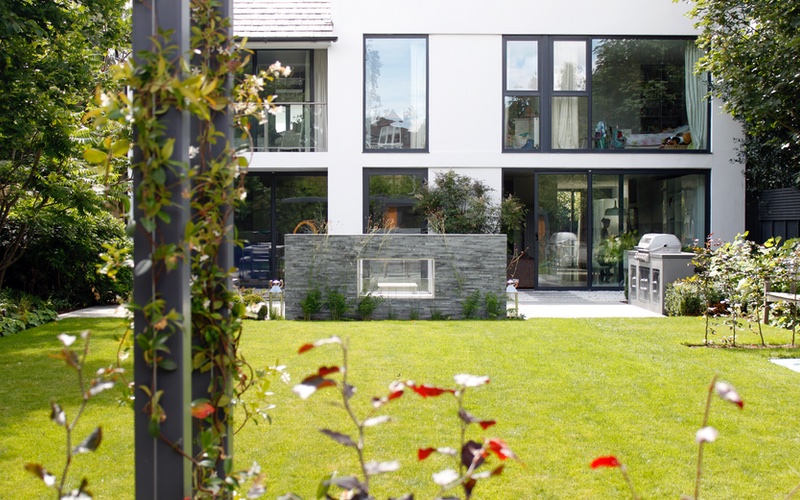
The design by Cassandra Crouch meant that the garden and house felt right together.
At Landscaping Solutions we work with some of the leading garden designers in the UK. We regard our role as providing a safe pair of hands when it comes to delivering the design, taking worry off the shoulders of both garden designer and householder. This is exactly what we did for Cassandra Crouch with this beautiful space on the edge of Richmond Park, South West London.
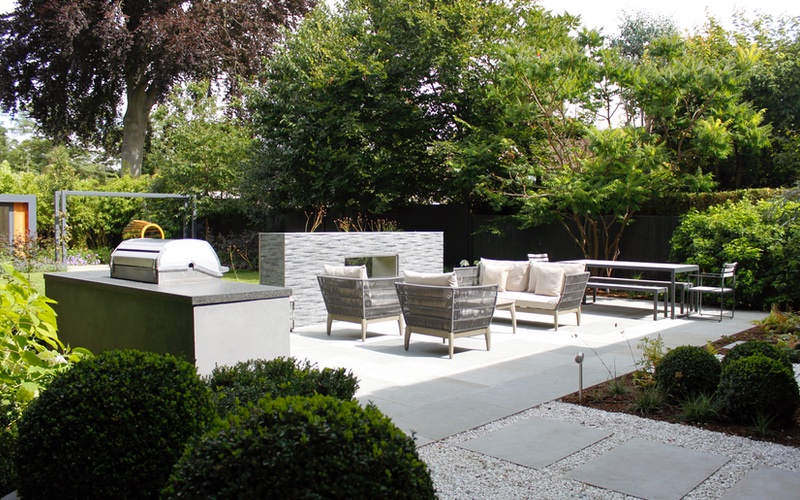
BALI award-winning garden, in South West London, designed by Cassandra Crouch.
Typical of family gardens, this one had a wide-ranging brief. It needed areas for:
- adult exercise and children’s play
- entertaining and outdoor cooking, during the day and after dark
- for rest and relaxation
- for storage
And while the clients were not particularly keen on gardening, they did want a variety of heights and textures in the planting to create year-round interest.
The house has a rectilinear, minimalist feel, and Cassandra’s design gives it a strong sense of place with the use and overlap of strong squares and rectangles in the design - even the trampoline is square. Cassandra’s Crouch’s design marries the garden to the building, creating a relaxing space that feels right at home.
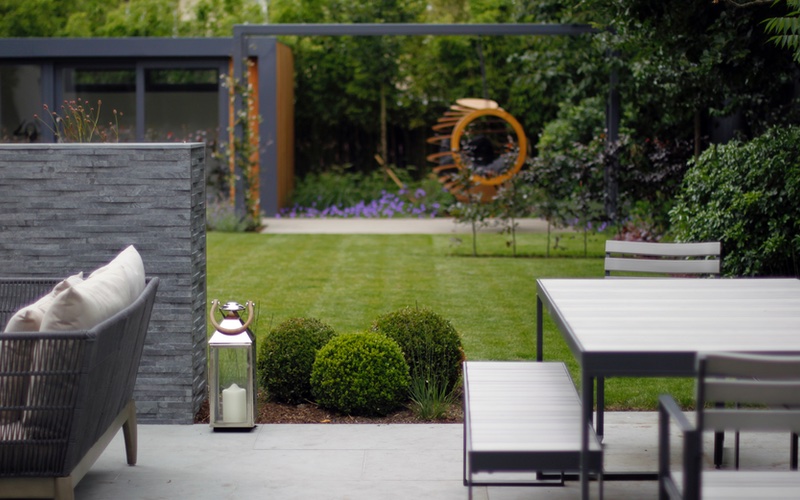
Beams made by Leighton Ironcraft support a hanging seat that offers a contrasting shape to the lines and rectangles.
Generous beams support the hanging seat; grassed and paved areas have straight edges and ninety-degree angles on their corners; the fireplace feature and barbecue are strongly rectangular.
A design like this needs a highly accurate finish - imperfections in angles and straight lines are immediately visible. At the same time, the variety of materials requires skill and experience to integrate them seamlessly, as well as very careful attention to detail to ensure that levels match and surfaces move smoothly from one texture to another.
We pride ourselves at Landscaping Solutions on creating a luxury finish. “They are passionate about construction,” says Cassandra, “and strive to achieve very high standards.”
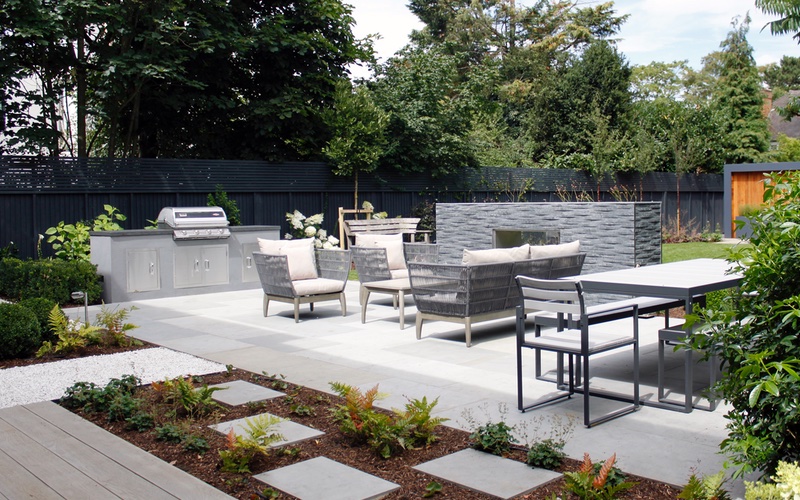
Sawn Grey Yorkstone and Smoked Oak Millboard combine textures in this garden designed by Cassandra Crouch in South West London.
High-quality materials completed the sense of luxury. The patio uses Sawn Grey Yorkstone (supplied by London Stone) which tones beautifully with Millboard’s Enhanced Grain Smoked Oak composite decking, laid at the access to the house and around the gym/studio, while adding contrasting texture.
This was a garden design that required a wide range of landscaping skills. As well as laying different materials and recycling existing paving to allow access to a storage area hidden behind the gym, we installed textured tile cladding and stainless steel beading to the fireplace, put in the barbecue and then rendered and painted its housing to tone with the overall colour scheme. Light-coloured aggregate around paving stones was retained in a stabilising system to prevent gravel migrating to beds and paving and to make a stable surface to walk on.
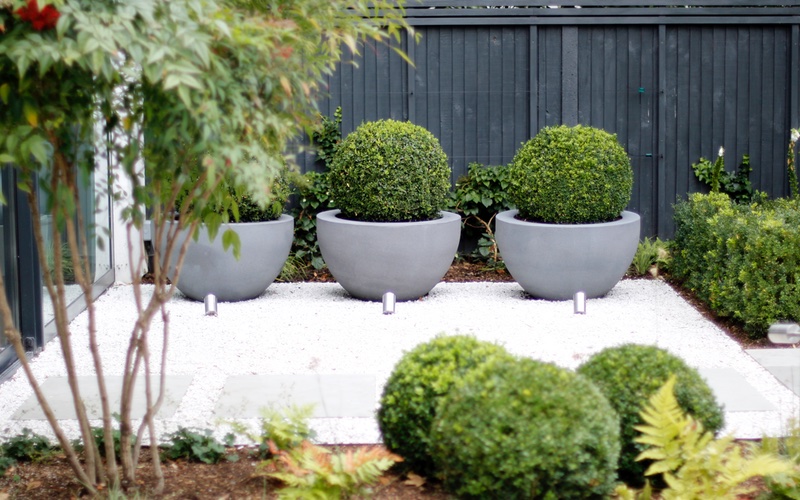
Round box balls, uplit at night, add contrasting shape and texture in a garden which the owners wanted to be easy to look after.
Lighting, which picks out shape and texture at night and focuses on the barbecue and seating area for extended evening use, was installed by Electrosafe Landscape Lighting Ltd, overseen by us at Landscaping Solutions. The drip-irrigation system, which we installed, will reduce work in the garden and ensure the survival of plants while the home-owner is on holiday.
Badgers!
So far, so normal for our teams at Landscaping Solutions. However, this build introduced an interesting additional element - badgers in a neighbouring garden.
Badgers are protected by law, as are their setts, and if works needs to be done in their vicinity, a licence is required from Natural England.
Landscaping Solutions happily shouldered the responsibility of ensuring everything was done as it should be. Natural England required the installation of night cameras to monitor sett entrances for two weeks. With no badger activity recorded, work could progress.
“I was really pleased to have had the challenge,” says Landscaping Solutions’ Ben West. “It means we learned best practice for the situation and allowed me to get up close and personal with one of my favourite British mammals. I’ve been badger-watching since I was a young lad so it was second nature for me to want to do the best by the badgers.”
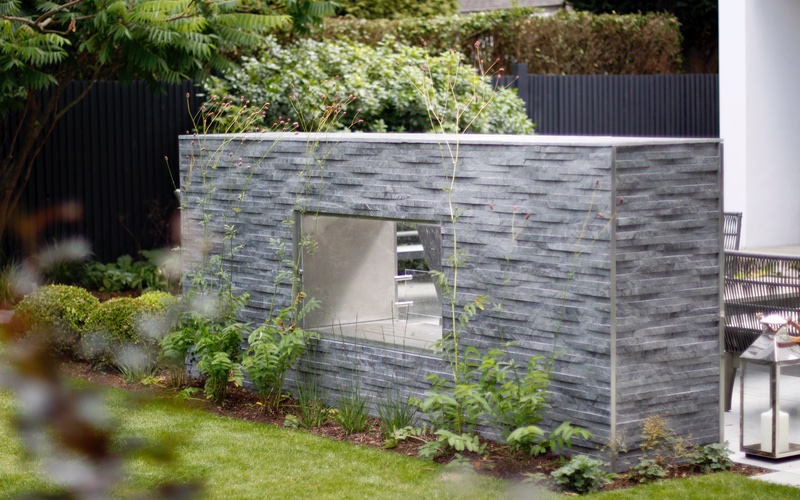
Textured tiles clad the outdoor fireplace with stainless steel beading to finish the edges.
In the meantime we shifted our schedule to make progress in other areas of the garden, away from the badger area. Good communication with garden designer Cassandra Crouch and the homeowners meant we could be flexible in our approach and work out an efficient reorganisation of the sequence of jobs required.
We completed the build in a couple of months, in June 2016. It went on to win us our fourth BALI award, and our second Principal Award, this time in the category of Domestic Garden Construction (£60K-£100K).
“The team are professional and pleasant to work with,” said Cassandra. “Both the client and myself are extremely happy with the result. I would not hesitate to recommend them to clients in the future.”
See our other award-winning gardens.
Contact Ben West to find out how we can help you create a luxury garden to the highest standards for your clients. If you’re a home-owner looking to enhance your living space, we can refer you to talented garden designers. Just get in touch to discuss.